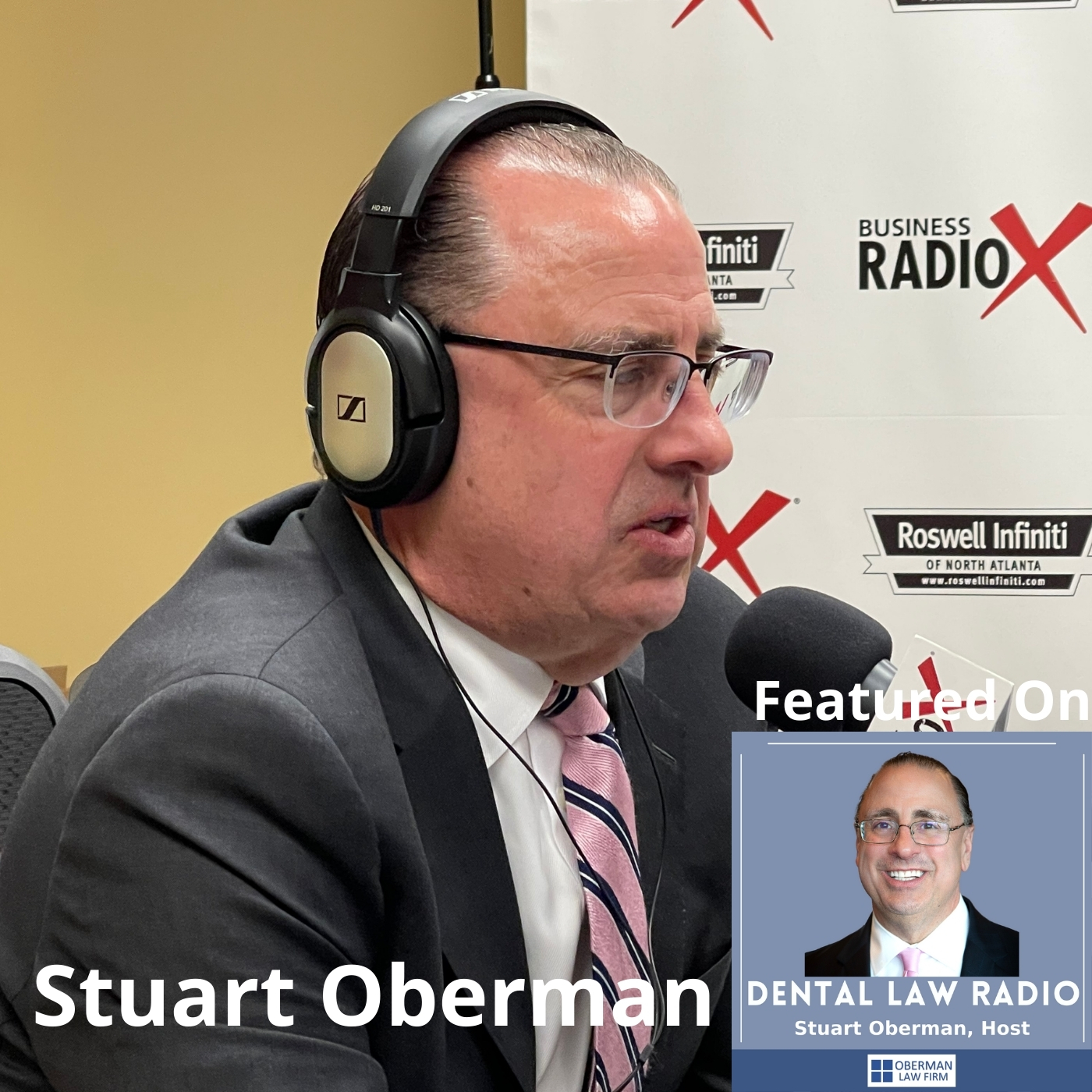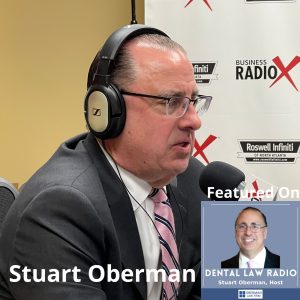

Here Comes the Government! Are You Prepared for a Medicaid Audit? (Dental Law Radio, Episode 11)
In the last several months, host Stuart Oberman of Oberman Law Firm has noted a significant government crackdown on Medicaid fraud. Even if your practice has not engaged in any malicious activities, an audit which uncovers shoddy recordkeeping can turn out to be both painful and expensive. Stuart discusses the problem and offers a few remedies in this episode. Dental Law Radio is underwritten and presented by Oberman Law Firm and produced by the North Fulton studio of Business RadioX®.
TRANSCRIPT
Introduction: [00:00:01] Broadcasting from the Business RadioX Studios in Atlanta, it’s time for Dental Law Radio. Dental Law Radio is brought to you by Oberman Law Firm, a leading dental-centric law firm serving dental clients on a local, regional, and national basis. Now, here’s your host, Stuart Oberman.
Stuart Oberman: [00:00:24] Hello everyone, and welcome. And I tell you what, we’re going to hit the topic really hard today. Here comes the government. Are you prepared for a Medicaid audit? I will tell you, if you are not, you better be. Probably in the last – I don’t know – four to six months, we’ve seen a massive, massive, massive across the board excessive government crackdown on Medicaid.
Stuart Oberman: [00:00:51] And that involves a lot of things. It involves different states, different Attorney Generals Offices, throughout the state’s Office of Inspector General, OIG. A lot of the states are getting more active in this area because of the fraud and abuse. And we’re finding a lot of it is fraud and abuse, but a lot of it is just, frankly, sloppy recordkeeping on the part of the doctors. Nothing necessarily malicious, just really, really, really bad recordkeeping.
Stuart Oberman: [00:01:22] So, we want to walk through a couple of things. This could be a five hour topic, but we want to keep it brief to the point and sort of give you guys what’s on the verge of coming. It is very tedious, it is very time consuming to get an audit by an Attorney General’s Office, depending on what state you’re in, and, also, the Office of Inspector General on the Federal side. We’re seeing a lot of clampdowns on sole practitioners, middle market providers, and big DSOs.
Stuart Oberman: [00:02:02] So, once you get these kind of inquiries, I cannot stress enough, you have to take immediate and defensive action. There is no room for negotiation upfront, there is no room for playing games upfront. You have to hire counsel who understands this. You have to hire counsel who understands the white collar crime area, if you will.
Stuart Oberman: [00:02:34] We are, I say, fortunate in a lot of areas in that we work in this space a lot. And I want to add a couple of things to what to look at should you be convicted or found guilty of fraud. Now, we’ve got civil, we got criminal, so there’s a mixture here that we’re going to look at. But I want to take a look at the civil side more so than anything else, because a lot of it is all money based, recruitment, clawbacks from the government. So, I want to make sure we’re not getting into the criminal side so much. I want to talk about the overall investigation.
Stuart Oberman: [00:03:16] So, what happens is, you get this nice little letter from the government, that’s a subpoena, State or Federal, that says you have committed Medicaid fraud. That’s going to, probably, be a 12, 15 page request for production of documents. So, now, what do you do? Now, you’ve got to dig through 100 or 200 charts. You’ve got to put all these files together. You’ve got to document every file that you have. You’ve got to catalog every file you have. You have to produce these files in a certain electronic format. You have to be very careful how this is presented. You have to be very careful how you preserve your objections. You have to be very careful how these are downloaded and sent over to the government.
Stuart Oberman: [00:04:09] So, what happens is, the government, through their investigative powers, will, essentially, turn you out time-wise. Now, it is impossible for you to handle this internally with your office manager. There’s just no way to do it from backroom production.
Stuart Oberman: [00:04:26] So, going forward a little bit, once you turn over the documents, it is absolutely incumbent that you do an internal audit. Because invariably the government is going to find something. If you have an IRS audit, the government is going to find something. So, what do you do? Let’s say, you are found guilty of fraud and abuse. Bookkeeping problems, staff turnover, headaches, billing issues, can’t match records, X-rays don’t match treatment, treatment don’t match bills, bills to match invoices, EOBs don’t match anything. So, now you’ve got to reconcile.
Stuart Oberman: [00:05:06] So, what happens is, depending on the level – we’re talking about the Federal level because there’s so many variance in State – they’re going require you to enter into – what’s called – a Corporate Integrity Agreement, CIA. If you never heard of the CIA and you’re in a Medicaid area, you need to call someone who understands what those are. Just like the one yesterday, a 35-page integrity agreement from a DSO on a national level. It’s was 35 pages and outlines certain things. So, what happens is, you have to set up a program according to these guidelines. Generally, your CIAs will last about five years.
Stuart Oberman: [00:05:59] So, in exchange for entering into this CIA, they say, “We’re going to allow you to participate in Medicaid, Medicare, or other governmental healthcare programs. And because we’re such nice guys, we’re not going to exclude you from these programs. We’re going to allow you to run your business, your practice. However, we’re going to put you under some serious, serious scrutiny. And if you don’t comply with it, then you’re going to have a really big problem, because now we’re going to come back and reinforce this as far as the penalties go.”
Stuart Oberman: [00:06:38] So, some of the requirements were going to run through are fairly comprehensive. This is not something you can do with your office manager. These are very specific programs, implementations that have to be done. So, one of the things they’re going to do is they’re going to require you – and all these you should have anyhow. If I’m going through this list and you don’t have these, you’re already under the gun on the Medicaid/Medicare side and Federal Healthcare Program side.
Stuart Oberman: [00:07:10] First and foremost, they’re going require you to hire a compliance officer and appoint a compliance committee. Depending how big you are, you may not need a committee, but you’re going to need a compliance officer. If you don’t have a compliance officer already in your office, you already got a problem. Now, to develop a standard procedure and policies for the implementation of these programs, which you should have already, again.
Stuart Oberman: [00:07:32] Now, I would say about 90 percent of our clients, their staff is not trained for these comprehensive governmental reimbursement programs. They’re just not. In today’s market, you’re lucky to get a body in the office sometimes and then try to train someone who understands the billing process on the governmental payer side is almost an act of Congress nowadays. So, you’ve got to have a training program. You got to have a program, you have employees anyhow.
Stuart Oberman: [00:08:02] You’ll be required to retain independent review organization and conduct annual review. So, it’s going to be disclosed annually as to what the issue is. You got to go back on an annual basis. Again, I can’t stress this enough, you already have these employees – establish a confidential disclosure program.
Stuart Oberman: [00:08:26] I would say a substantial part of our clients who have State or Federal governmental assistance in their practices do not do a check on their employees to see if they are even eligible to work in the office or participate in the Medicare/Medicaid programs, which is an absolute disaster from day one. Every employee that you hire, you have to check their eligibility, especially on the government, State and Federal, pair side. You have to volunteer report overpayments, reportable events, and ongoing investigations, legal proceedings, et cetera. If you do not, again, you are in violation of the CIA agreement. And that comes under additional scrutiny.
Stuart Oberman: [00:09:26] So, what you ought to have to do is, you also have to provide an implementation report on an annual basis – a lot of times to OIG or, again, Attorney General’s Office, depending what you’re working with – a state of your compliance activities. So, if you don’t already have these things in place, you should. Because what happens is, if you don’t have these things in place already, you’re already behind the eight ball with an audit. Now, I would strongly recommend that if you have State or Federal payment systems within your practice, you literally will dissect your entire process. What your procedures are, take a look at these guidelines, take a look at these outlines, implement a program.
Stuart Oberman: [00:10:18] If you have any questions, you know, let us know. We are actively engaged in these particular areas. They are a trap for the unwary. They are a trap for the doctors and their staff who don’t understand this process. And there’s nothing worse, nothing worse, than getting a chart request subpoena from State or Federal for a copy of your entire chart, X-rays and everything. Unless, you know you’re doing your internal audit making copies, you can’t find X-rays, you can’t find records, you got your records in the wrong file, you have records that don’t match, you have billing that doesn’t match. It is the absolute recipe for disaster.
Stuart Oberman: [00:11:08] So then, once you get through producing documents, then we work with our clients to figure out what the pros are, what the cons are, know before they issue their report as to where your exposure is.
Stuart Oberman: [00:11:23] So, again, this is a whole another audit topic that we could discuss for days and days. But this is always coming down the pike. And I think our doctors have got to be aware as to what the aggressive action is. If you’re thinking about the State Attorney General’s Offices and Inspector General Offices, especially in the southeast, they’re getting very, very aggressive. It’s a zero sum game. It’s not something you’re going to win. You just have to mitigate. And if you don’t understand how to mitigate it, then you’re going to be hit pretty hard on some clawbacks, potentially lose your license, lose your practice, lose your livelihood.
Stuart Oberman: [00:12:05] So, again, take a look at what some of these outlines are. And I would urge you to take a look at your practices, evaluate it. You can make a very good living on this, but you have to document, you have to be prepared for an audit. And I always say, if you’re under the third party payer system, it is not when, but if you’re going to be audited, and it’s better to be proactive.
Stuart Oberman: [00:12:34] Thank you everyone for joining us today. Hopefully, we’ve had some good information. And we’ll look forward to seeing you on our next podcast. If you have any questions, please feel free to give us a call, 770-886-2400. My name is Stuart Oberman, and you can reach me at Stuart, S-T-U-A-R-T, @obermanlaw.com. Have a great day. Thank you everyone.
About Dental Law Radio
Hosted by Stuart Oberman, a nationally recognized authority in dental law, Dental Law Radio covers legal, business, and other operating issues and topics of vital concern to dentists and dental practice owners. The show is produced by the North Fulton studio of Business RadioX® and can be found on all the major podcast apps. The complete show archive is here.
Stuart Oberman, Oberman Law Firm

Stuart Oberman is the founder and President of Oberman Law Firm. Mr. Oberman graduated from Urbana University and received his law degree from John Marshall Law School. Mr. Oberman has been practicing law for over 25 years, and before going into private practice, Mr. Oberman was in-house counsel for a Fortune 500 Company. Mr. Oberman is widely regarded as the go-to attorney in the area of Dental Law, which includes DSO formation, corporate business structures, mergers and acquisitions, regulatory compliance, advertising regulations, HIPAA, Compliance, and employment law regulations that affect dental practices.
In addition, Mr. Oberman’s expertise in the health care industry includes advising clients in the complex regulatory landscape as it relates to telehealth and telemedicine, including compliance of corporate structures, third-party reimbursement, contract negotiations, technology, health care fraud and abuse law (Anti-Kickback Statute and the State Law), professional liability risk management, federal and state regulations.
As the long-term care industry evolves, Mr. Oberman has the knowledge and experience to guide clients in the long-term care sector with respect to corporate and regulatory matters, assisted living facilities, continuing care retirement communities (CCRCs). In addition, Mr. Oberman’s practice also focuses on health care facility acquisitions and other changes of ownership, as well as related licensure and Medicare/Medicaid certification matters, CCRC registrations, long-term care/skilled nursing facility management, operating agreements, assisted living licensure matters, and health care joint ventures.
In addition to his expertise in the health care industry, Mr. Oberman has a nationwide practice that focuses on all facets of contractual disputes, including corporate governance, fiduciary duty, trade secrets, unfair competition, covenants not to compete, trademark and copyright infringement, fraud, and deceptive trade practices, and other business-related matters. Mr. Oberman also represents clients throughout the United States in a wide range of practice areas, including mergers & acquisitions, partnership agreements, commercial real estate, entity formation, employment law, commercial leasing, intellectual property, and HIPAA/OSHA compliance.
Mr. Oberman is a national lecturer and has published articles in the U.S. and Canada.
Oberman Law Firm
Oberman Law Firm has a long history of civic service, noted national, regional, and local clients, and stands among the Southeast’s eminent and fast-growing full-service law firms. Oberman Law Firm’s areas of practice include Business Planning, Commercial & Technology Transactions, Corporate, Employment & Labor, Estate Planning, Health Care, Intellectual Property, Litigation, Privacy & Data Security, and Real Estate.
By meeting their client’s goals and becoming a trusted partner and advocate for our clients, their attorneys are recognized as legal go-getters who provide value-added service. Their attorneys understand that in a rapidly changing legal market, clients have new expectations, constantly evolving choices, and operate in an environment of heightened reputational and commercial risk.
Oberman Law Firm’s strength is its ability to solve complex legal problems by collaborating across borders and practice areas.
Connect with Oberman Law Firm:
Company website | LinkedIn | Twitter















